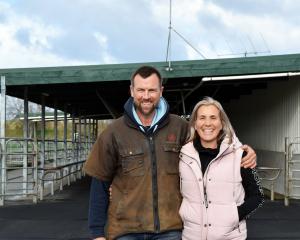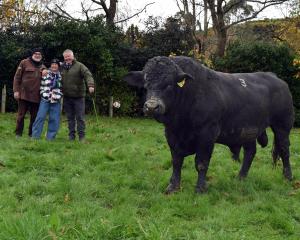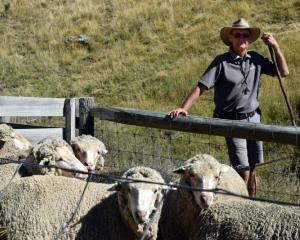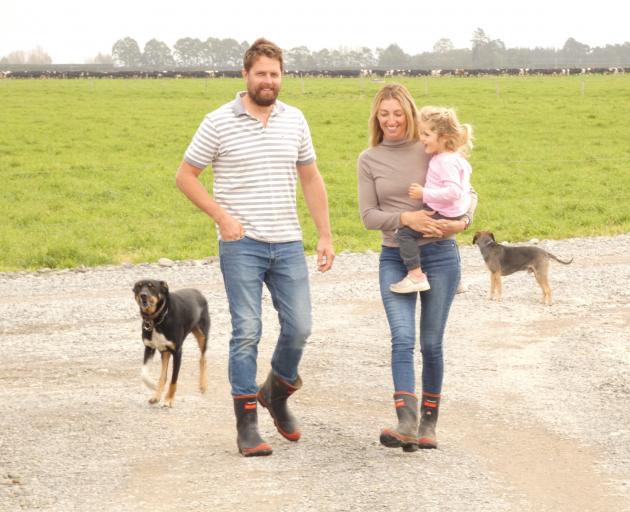
Nobody told Braden and Brigitte (Biddy) Barnes that buying their first farm would be so stressful.
The 50:50 sharemilkers on a 1150-cow farm at Eyrewell Forest have worked and saved hard to get into a position to progress their dairy farming business into buying an entry level property.
After scouring the market for their next home, preferably without equity partners, they have their eye on a few farms.
Finding the ideal property is not easy as they are competing with cashed-up buyers.
Then there is the legal, due diligence and counter-offer process to navigate in a high-payout season of $10 a kilogram of milksolids when cow and land prices swing upwards.
Nonetheless, they take the view their perseverance will be rewarded in the end.
So they have set their sights on something as close to perfect as they can find with compromises intermingling with non-negotiables and must-haves.
"Yes, it has been stressful because we are running a business and family and it’s a whole load of more work that’s out of the norm," Mrs Barnes said.
"It’s not like buying a house where you go and look at 10 houses in the weekend. You have to be flexible all the time while sticking to your goals, and also knowing you can’t get everything you like."
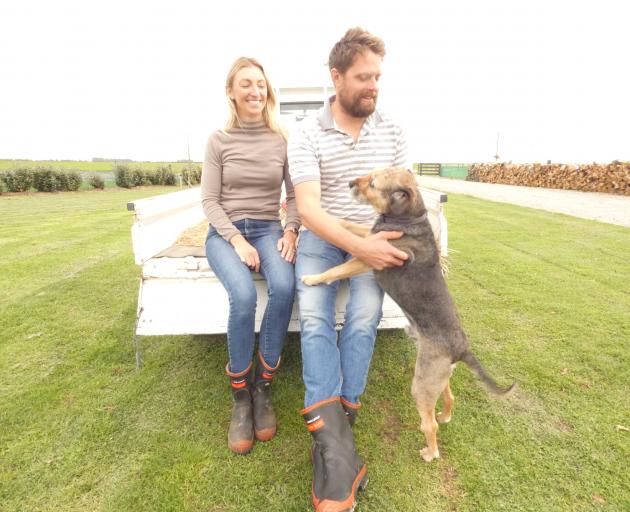
"Everybody said your first farm isn’t going to be perfect. But your second or third farm isn’t going to be perfect either. We will just have to find something that is as perfect as it can be. Then there is the stress of multi-offers and the market at the moment has probably just gone berserk because of payout, cows and people trying to get in, but you have to stay positive."
They joke they are happy to buy a farm anywhere as long as it is in Canterbury which is where their hearts are set for a new home.
The Barnes have managed to get into a farm-buying position by working up the dairy ladder from the bottom and through savvy investing.
Their dream has been "fast-tracked" by the couple in their late 30s becoming one of three Fonterra and ASB First Farm winners at the Dairy Industry Awards.
Within the prize package is a loan facility of up to $1million fixed at a 1% per year rate for three years.
Putting the generous loan to one side, the award was gratifying for another reason, Mrs Barnes said.
"It’s been incredibly validating to be recognised and celebrated by the industry because it confirms we are on the right path and we have a place in dairy farming in New Zealand. The award removes some of the biggest barriers of farm ownership like financing and start-up costs and gives us the confidence to take the next step. It’s not just a financial boost, it’s a vote of confidence in our vision, work ethic and our long-term commitment to the industry."
In 2021 they narrowly missed out being a top three placegetter in the Canterbury North Otago Sharemilker of the Year competition, after winning three categories. So, feeling slightly out of their league, the big win was a special moment.
Mr Barnes said the judges recognition of their potential had given them momentum.
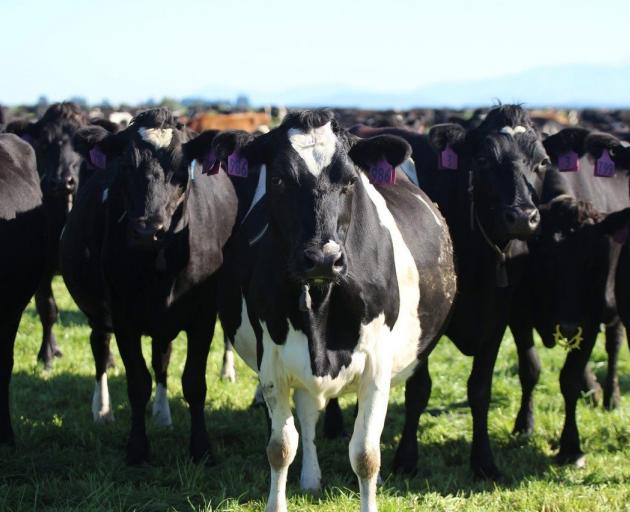
A visit to the ASB tent confirmed the competition was at the closing stages of accepting entries.
"Anyway, we sent in our application and got an email we might want to rethink this to next year as there is quite a bit of work to do," Mrs Barnes said.
"I asked how much time we had to do this? We got given to midnight and that’s what we did. Luckily, we were already in the process of running these numbers so we just needed to package it."
Among the other prizes are $20,000 of Farm Source account credit to invest in their first farm and a tailored package including mentoring and special offers by Fonterra to transition into farm ownership.
She said they were already close to financially being in a position to buy a farm, but would not have got there this season because of the high payout.
The award had made it more possible, she said.
"So, it has fast-tracked us ... we would ideally like to stay here, but we are realistic and it’s probably not going to be the dream farm right away. We are open to compromises like run-down infrastructure and just something that needs a bit of love. But we don’t want to compromise on things that you can’t change so it needs to have good soils and access to water and eventually have the potential to become a very efficient, profitable little farm."
Mr Barnes said they were trying to avoid being too prescriptive.
"We have to be realistic that a 300,000kg milksolid farm is probably going to be another couple of million dollars, whereas a 200,000 milksolid farm will be cheaper and more realistic if we want to buy it ourselves. It would be ideal to have a farm like here, but we are not there yet."

Budget-wise, they could not afford a 1000-plus cow farm unless they found an equity investor. They were not dismissing this option, but their first choice was to go it alone.
"So 500 to 800 cows seems to be do-able on our own, but anything beyond that we would need a partner."
A visit to a herd home had convinced them a pasture management property was for them, he said.
He said the rural real estate market was competitive.
"A lot of people want to stay in Canterbury or own a farm in Canterbury because it’s profitable and reliable. And then the other reason is there are a lot of buyers out there because somebody might own two or three farms and can just leverage that and go buy another one and that’s why it’s competitive. If the neighbour’s block pops up you don’t get a shoe in because they can just go in with a higher price."
Everybody wanted to be in dairy farming during a $10/kg payout because of the better return on assets than other investments, he said.
The Barnes met on a Culverden farm.
Returning from overseas travel, he worked on the family farm before heading south in 2012. Over four years he progressed from being a farm assistant to a manager in the North Canterbury district.
She moved to work on the same farm as him in 2013 and rose through the ranks to become second-in charge on another farm.
A qualified veterinary nurse, she had worked previously in the horse racing industry in Singapore for three years and then six months in the United Kingdom.
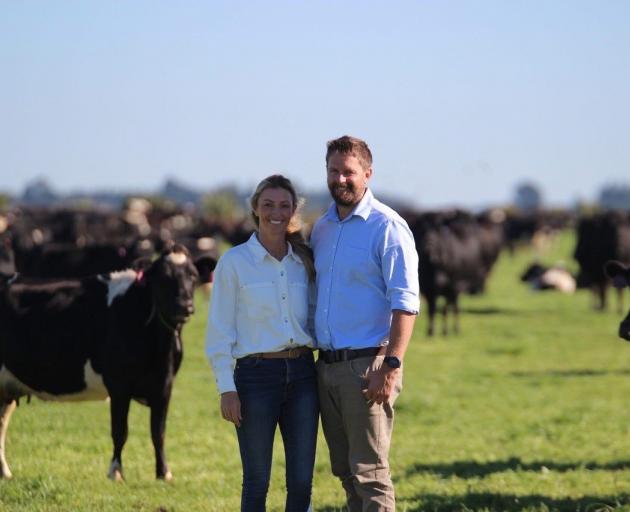
A challenging contract milking role was taken on at a 1500 cow herd farm with two sheds, 10 staff and K-line irrigation in Duntroon in 2016.
To build on their farming leadership they signed up to as many courses as they could and learned how to work on the business rather than in the business.
Returning to Culverden, they took on another contract milking role for two years before heading to Eyrewell Forest.
This is the Barnes’ fourth sharemilking season with another season to go.
Their large herd on 351 effective hectares will complete 546,000kg of milksolids when they are dried off this week at about 475kg per cow.
A Friesian dominant herd being bred into a Kiwicross base is milked twice a day and then three times every two days from January onwards and then once-a-day towards the end of the season.
They are shaping the herd towards more compact-framed cows with high production and less of an appetite.
A pasture-based 3 system is topped up with grain in the shed, canola added in the spring, alongside a mineraliser and silage with maize brought in during the shoulders of the season.
While they own the herd, their closed system contract stipulates they had to buy the cows on the farm and will have to sell them back.
That means they will have to start up again, aside from potentially being able to take some surplus replacements this coming calving.

"So we will be able to take those and keep up with technology. The cows have been on them for one season and it’s opened our eyes up how it saves you all that time in the shed and it’s invaluable."
They have managed to build up equity and pay down debt as fast as they can by accumulating cow numbers and investing in residential rental housing.
One of the properties is in Rangiora and the others are in Katikati between Tauranga and Auckland.
The northern houses were inherited from Mr Barnes’ dairy farming family and remortgaged to help them buy the first 960 cows and in-calf rising-two-year-old heifers when they entered sharemilking. Another 230 leased cows have since been paid off for a debt-free herd.
"It’s part of our succession planning and using our inheritance by leveraging to pass it on, " Mr Barnes said.
"We want a succession plan for our children. It’s not about buying more and more farms, but more about being financially secure to give them an opportunity when they are ready if they want to farm, buy a property or start a business and not being stretched when we get to that point."
They want their children, Heidi, 6, Jock, 4, and Ginny, 2, to enjoy a rural upbringing.
Against the odds, all of them have the same birthday on November 16, more by plan than coincidence.
"It’s very suitable for rearing calves," Mrs Barnes said.
"It’s a busy time of the year anyway when you’re not being sociable between August and November so you may as well be pregnant."
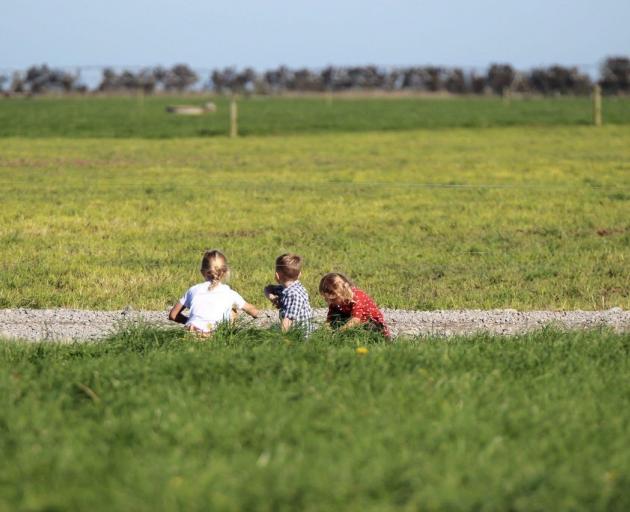
Over the past 14 years their nest egg has also grown by trading stock and rearing surplus calves and selling empty cows.
Breeding up their herd with LIC premier sires has been another way they have increased equity.
"We’ve improved our herd since we’ve owned it," Mrs Barnes said.
"It was below national average for Breeding Worth when we started and now it’s in the top 10% over four seasons. We really honed in on the younger animals and breeding replacements from them and breeding our low BW cows to beef."
Over time they have recognised each other’s strengths and divided roles accordingly.
With the arrival of three children Mrs Barnes has spent less time in the milking shed, but fills the gap on occasion to put the cups on, get cows in, drive a tractor or test the herd.
Other than that, she is in charge of calf rearing, administration, finance and the contracts.
The life of a sharemilker or contract milker means they live in farm accommodation and always have the Gypsy Day shift at the back of their minds.
They cannot wait to put "roots down" on their own farm with their own family home, hopefully soon.


